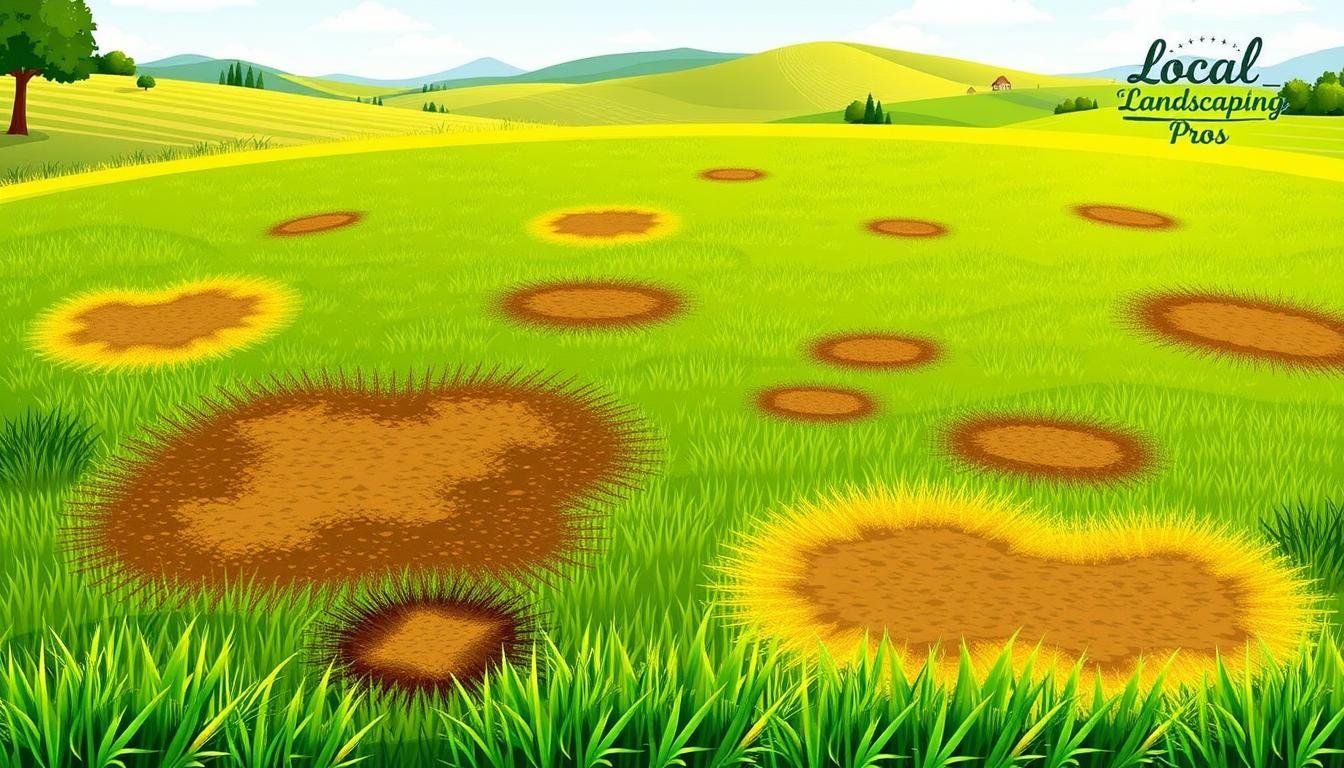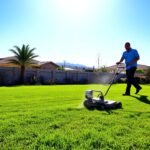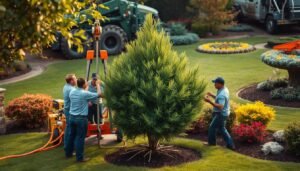
Did you know 80% of lawn problems in Temecula come from just four diseases? This fact shows how crucial it is to know and tackle grass diseases here. A beautiful lawn can quickly become patchy and discolored if you ignore lawn disease signs and treatments.
Temecula’s climate is perfect for some grass diseases to grow. Problems like brown patch and dollar spot can harm your yard. But, with the right knowledge and tools, you can keep your lawn looking great all year.
In this guide, we’ll look at the most common lawn diseases in Temecula. We’ll teach you how to spot them early, understand what causes them, and how to treat them. This info is key for anyone wanting to keep their outdoor space looking good.
Key Takeaways
- Four diseases account for 80% of lawn problems in Temecula
- Early detection is crucial for effective treatment
- Temecula’s climate creates ideal conditions for certain grass diseases
- Proper lawn care can prevent many common diseases
- Understanding symptoms helps in quick lawn disease identification
Understanding Lawn Diseases in Temecula
Temecula’s climate and soil are perfect for lawn diseases to grow. Knowing about these problems is key to keeping your lawn healthy. Let’s look at what causes them, how to spot them, and why it’s important to catch them early.
What Causes Lawn Diseases?
Lawn fungus grows due to several reasons. Poor drainage, too much water, and high humidity are big helpers. Also, not enough nutrients and bad mowing habits can weaken the grass, making it easy for diseases to attack.
Key Symptoms to Look For
It’s important to catch lawn diseases early. Here are some signs to watch for:
- Discolored patches of grass
- Thinning or bare areas
- Unusual growth patterns
- Visible fungal structures
Importance of Early Detection
Finding lawn diseases early can save your lawn and money. Regular checks can spot problems before they get worse. Early action means you won’t have to do a big renovation.
| Disease | Early Symptoms | Recommended Action |
|---|---|---|
| Brown Patch | Circular brown areas | Reduce watering, improve air circulation |
| Dollar Spot | Small, straw-colored spots | Balance nitrogen levels, water deeply |
| Pythium Blight | Greasy, water-soaked patches | Improve drainage, apply fungicide |
Knowing about lawn diseases helps you keep your lawn healthy in Temecula’s tough climate. Being proactive with lawn care is the best way to prevent and manage these problems.
Common Lawn Diseases You Might Encounter
Knowing how to spot lawn diseases is key to a healthy yard in Temecula. Catching these problems early helps prevent them. Let’s look at some common lawn diseases you might see.
Brown Patch
Brown patches are a clear sign of this fungal disease. It loves hot, humid weather, causing circular dead spots. These spots can grow from a few inches to several feet wide.
Pythium Blight
This disease can spread fast, damaging your lawn quickly. It starts with small, circular, water-soaked spots that turn brown fast. In bad cases, the grass may feel greasy or slimy.
Dollar Spot
Dollar spot creates small, circular patches of dead grass, about the size of a silver dollar. These spots can grow together, causing bigger damage. Look for tan lesions with reddish-brown edges on grass blades.
Powdery Mildew
This fungal disease covers grass blades with a white, powdery substance. It likes shaded areas with poor air flow. Affected grass may turn yellow and thin out.
| Disease | Symptoms | Conditions |
|---|---|---|
| Brown Patch | Circular dead spots | Hot, humid weather |
| Pythium Blight | Water-soaked spots | High humidity, poor drainage |
| Dollar Spot | Small circular patches | Low nitrogen, drought stress |
| Powdery Mildew | White powdery coating | Shade, poor air circulation |
Knowing about these common lawn diseases helps you spot and treat them early. Remember, preventing grass diseases starts with good lawn care and regular checks.
Prevention and Treatment Options
Effective lawn disease control starts with prevention. Good lawn care practices can greatly reduce disease risk. Let’s look at how to keep your lawn healthy and handle problems when they come up.
Best Practices for Lawn Care
Proper lawn maintenance is key to preventing diseases. Water deeply but not too often to help roots grow strong. Mow at the right height for your grass and don’t cut too much at once.
Aerate and dethatch your lawn every year. This improves air flow and reduces thatch.
Choosing the Right Treatments
When picking treatments, think about both chemical and organic options. Fungicides can work well, but using them too much can cause resistance. Natural treatments like neem oil or compost tea can also help.
Always know the disease you’re treating before you apply anything.
| Disease | Chemical Treatment | Organic Treatment |
|---|---|---|
| Brown Patch | Azoxystrobin | Compost Tea |
| Dollar Spot | Propiconazole | Neem Oil |
| Pythium Blight | Mefenoxam | Beneficial Bacteria |
When to Call a Professional
If diseases keep coming back, it’s time to get help from a pro. Lawn care experts have the tools and knowledge to help. They can create a plan just for your lawn.
A healthy lawn is your best defense against diseases. With the right care and quick action, you can keep your lawn looking great all year.
Tree Installation and Lawn Health
Tree installation is crucial for your lawn’s health. Adding trees not only beautifies your landscape. It also creates a balanced ecosystem that protects your lawn from diseases.
Local Landscaping Pros – Murrieta offers top-notch tree installation in Temecula. Their team places trees wisely, enhancing soil quality and providing natural shade. This careful planning reduces grass stress, making it less likely to get diseases.
Choosing the right trees and their placement is essential for lawn care. The correct trees manage water runoff, prevent soil erosion, and create beneficial microenvironments. By picking Local Landscaping Pros, you’re investing in a healthier, more resilient lawn.
A well-planned landscape with well-installed trees does more than look good. It creates a thriving, disease-resistant lawn that you’ll enjoy for years.






No comment yet, add your voice below!